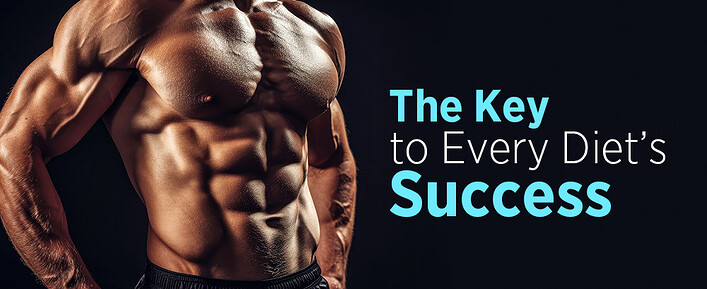by Chris Shugart
The Key to Every Diet's Success
Which works better, a low-carb or a high-protein diet? Researchers tested this and reached some surprising conclusions.
Let's sum up in one sentence what we know for sure about losing fat:
To lose fat, consume fewer calories (or expend more calories) than your maintenance intake, but be sure to lift weights and eat a high protein diet to prevent muscle loss, metabolism damage, and weight regain.
That seems simple enough, but there's a truckload of details and options to unpack: diet preferences, deficit amount, macro and micronutrients, satiety, hormone stuff, habits, TEF, blood sugar, supplements, and more.
When it comes to the different types of diets, all involve eating fewer calories. Sometimes, you count calories. Sometimes, you have a "don't eat" list that removes the problem foods or a "do eat" list of foods that keep you full, which is just another way of lowering calories.
Still, science loves to pit one diet strategy against another to see which works best, at least in research settings. In a new study, researchers wanted to compare two reduced-calorie diets: lower-carb and higher-protein.
The New Study
Why put these two strategies into a head-to-head competition? Well, because they overlap and get conflated. For example, lower-carb dieters typically increase their protein intake, and high-protein dieters naturally lower their carbohydrate intake. Both strategies involve some macro flip-flopping, and both work. So, what element (low carb or high protein) contains the magic?
Let's jump to the researchers' conclusion: The study found that weight loss and maintenance were more significantly influenced by the high-protein component of the diet rather than the low-carb aspect. In other words, higher-protein diets were deemed most effective for fat loss, and the high-protein component was the magic factor for losing and maintaining weight. (The fat content of the diets tested didn't significantly influence these outcomes.)
The 12-month study involved 132 people placed into different diet groups:
- Normal Protein, Normal Carb
- Normal Protein, Low Carb
- High Protein, Normal Carb
- High Protein, Low Carb
"Normal" is relative here. For example, the participants on high-protein diets consumed approximately 1.1 grams of protein per kilogram of body weight daily, while those on normal-protein diets consumed about 0.7 grams per kilogram. (That's 0.50 grams and 0.32 grams per pound, respectively.) So, the "high" protein eaters were eating more than the guvment and doctor groups recommend, but that's pretty low from a lifter's perspective.
Frustratingly, the study didn't provide many details about calories and carbs. We know that for the first three months, the diets provided 33% of the participants' energy requirements (calories). For the remaining nine months, they provided 67% of their energy requirements. As for carbs, we only know that the low-carbers consumed far fewer than the high-protein eaters.
So, we can only look again at their conclusions:
- Body weight loss and maintenance depend on the high protein but not on the low carb component of the diet.
- The magic of low-carb diets is calorie reduction, of course, but eating more protein facilitates that calorie reduction and helps keep the fat off after the diet.
Note: It's easy to assume that low-carb diets are doing something special because they trigger water-weight loss in the first week via glycogen depletion. Low-carb plans also lower insulin, and when insulin drops, the kidneys release excess sodium, which causes increased water excretion. When a person drops 3-10 pounds of scale weight in a week, he's happy, but it's mostly just fluid weight, much of it intramuscular.
How to Use This Info
I often say that to lose fat, just pick whatever flavor of calorie reduction appeals to you and works best, with the caveat of eating plenty of protein. This study seems to back me up. Other studies show that as long as your diet involves a calorie deficit and high protein, the details don't matter much.
Protein is the lynchpin. Sure, you could lose fat on a 900-calorie all-carb diet, but you'd feel starved and probably quit. If you will-powered your way through, you'd lose metabolism-supporting muscle mass and learn the term "fat rebound."
Whatever flavor of diet a lifter chooses, he or she should shoot for roughly one gram of protein per pound of body weight. Adjust the carb and fat calories to make room for it. Make it easy by consuming 2-4 scoops of MD Protein (Buy at Amazon) as part of your daily protein intake. That'll provide 44 to 88 grams. The rest is easy to get with regular foods.
MD Protein contains micellar casein, the only protein shown to be anti-catabolic, so not only does it increase protein synthesis, but it also helps prevent muscle breakdown. And it keeps you full longer.
For more info and ideas, check these out:
- The 5/2 Protein Diet
- The World’s Easiest Diet Strategy
- The Single Best Tip for Fat Loss
- The Cop Diet
- A Power Protein for Muscle Gain and Fat Loss
Reference
- Soenen, et al. Relatively high-protein or low-carb energy-restricted diets for body weight loss and body weight maintenance? Physiology & Behavior Volume 107, Issue 3, 10 October 2012, Pages 374-380.



